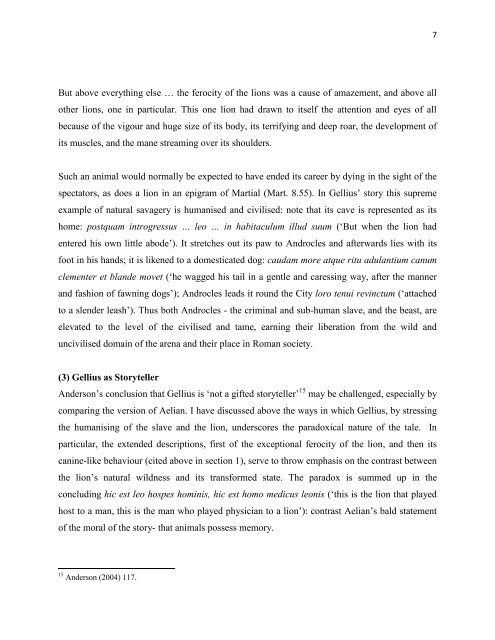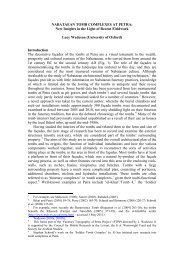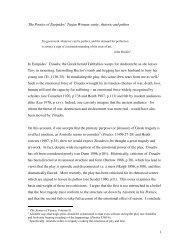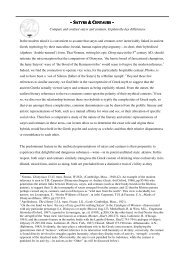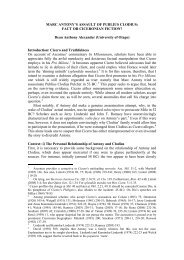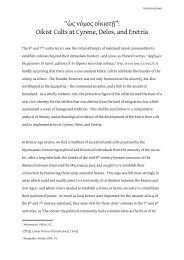'Reality, Paradox and Storytelling in Aulus Gellius' Narrative of ...
'Reality, Paradox and Storytelling in Aulus Gellius' Narrative of ...
'Reality, Paradox and Storytelling in Aulus Gellius' Narrative of ...
You also want an ePaper? Increase the reach of your titles
YUMPU automatically turns print PDFs into web optimized ePapers that Google loves.
7<br />
But above everyth<strong>in</strong>g else … the ferocity <strong>of</strong> the lions was a cause <strong>of</strong> amazement, <strong>and</strong> above all<br />
other lions, one <strong>in</strong> particular. This one lion had drawn to itself the attention <strong>and</strong> eyes <strong>of</strong> all<br />
because <strong>of</strong> the vigour <strong>and</strong> huge size <strong>of</strong> its body, its terrify<strong>in</strong>g <strong>and</strong> deep roar, the development <strong>of</strong><br />
its muscles, <strong>and</strong> the mane stream<strong>in</strong>g over its shoulders.<br />
Such an animal would normally be expected to have ended its career by dy<strong>in</strong>g <strong>in</strong> the sight <strong>of</strong> the<br />
spectators, as does a lion <strong>in</strong> an epigram <strong>of</strong> Martial (Mart. 8.55). In Gellius’ story this supreme<br />
example <strong>of</strong> natural savagery is humanised <strong>and</strong> civilised: note that its cave is represented as its<br />
home: postquam <strong>in</strong>trogressus … leo … <strong>in</strong> habitaculum illud suum (‘But when the lion had<br />
entered his own little abode’). It stretches out its paw to Androcles <strong>and</strong> afterwards lies with its<br />
foot <strong>in</strong> his h<strong>and</strong>s; it is likened to a domesticated dog: caudam more atque ritu adulantium canum<br />
clementer et bl<strong>and</strong>e movet (‘he wagged his tail <strong>in</strong> a gentle <strong>and</strong> caress<strong>in</strong>g way, after the manner<br />
<strong>and</strong> fashion <strong>of</strong> fawn<strong>in</strong>g dogs’); Androcles leads it round the City loro tenui rev<strong>in</strong>ctum (‘attached<br />
to a slender leash’). Thus both Androcles - the crim<strong>in</strong>al <strong>and</strong> sub-human slave, <strong>and</strong> the beast, are<br />
elevated to the level <strong>of</strong> the civilised <strong>and</strong> tame, earn<strong>in</strong>g their liberation from the wild <strong>and</strong><br />
uncivilised doma<strong>in</strong> <strong>of</strong> the arena <strong>and</strong> their place <strong>in</strong> Roman society.<br />
(3) Gellius as Storyteller<br />
Anderson’s conclusion that Gellius is ‘not a gifted storyteller’ 15 may be challenged, especially by<br />
compar<strong>in</strong>g the version <strong>of</strong> Aelian. I have discussed above the ways <strong>in</strong> which Gellius, by stress<strong>in</strong>g<br />
the humanis<strong>in</strong>g <strong>of</strong> the slave <strong>and</strong> the lion, underscores the paradoxical nature <strong>of</strong> the tale. In<br />
particular, the extended descriptions, first <strong>of</strong> the exceptional ferocity <strong>of</strong> the lion, <strong>and</strong> then its<br />
can<strong>in</strong>e-like behaviour (cited above <strong>in</strong> section 1), serve to throw emphasis on the contrast between<br />
the lion’s natural wildness <strong>and</strong> its transformed state. The paradox is summed up <strong>in</strong> the<br />
conclud<strong>in</strong>g hic est leo hospes hom<strong>in</strong>is, hic est homo medicus leonis (‘this is the lion that played<br />
host to a man, this is the man who played physician to a lion’): contrast Aelian’s bald statement<br />
<strong>of</strong> the moral <strong>of</strong> the story- that animals possess memory.<br />
15 Anderson (2004) 117.


